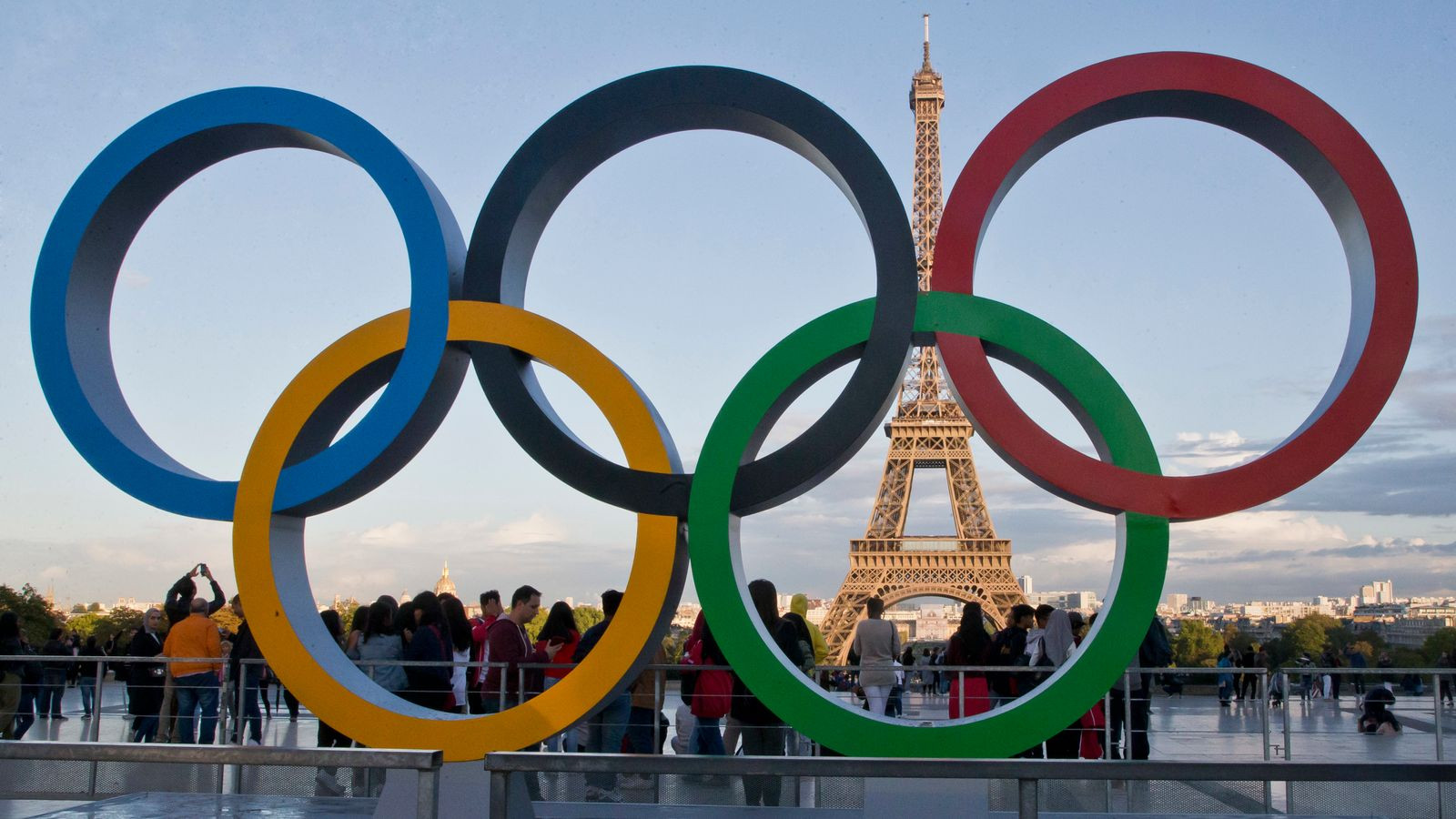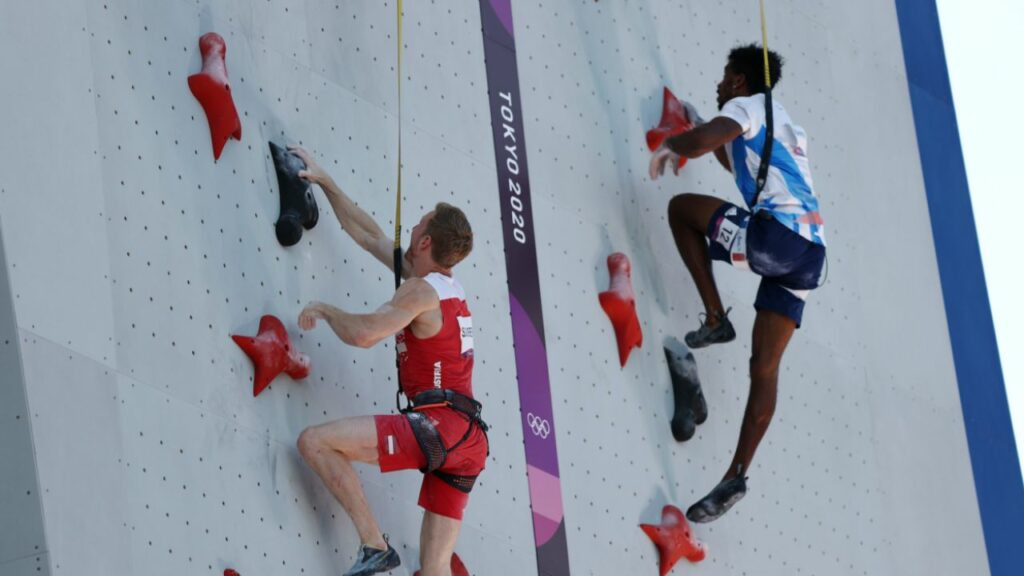Whether it's an athlete channeling Spider-Man to scale a wall at a frenetic pace or a climber making a difficult maneuver look easy, sport climbing is certainly an event that grabs attention. But what is it, exactly?
Sport climbing is a form of competitive climbing that dates back to the former USSR in the 1940s. The sport, which drew interest in the 1980s and is currently experiencing a boom in popularity, was first introduced to the Olympics in Tokyo.
The Three Disciplines
Sport climbing involves three different disciplines: Speed, boulder, and lead, each of which demand both physical and mental strength. At the Tokyo Olympics in 2021, sport climbing was held as one single event, combining the three disciplines. In Paris, sport climbing is being held as two separate events, with Speed as one standalone event and Boulder and Lead combined as the other.
Speed
Speed consists of a one-on-one showdown between two climbers who attempt to climb a 15-meter wall, with a slope at a 95-degree angle, in the fastest possible time. Speed, unlike Boulder or Lead, prioritizes quickness over technical skill. Also unlike Boulder and Lead, the route is identical for all climbers in Speed.
Boulder
Boulder is a more technical climb where athletes, without the aid of a safety rope, attempt to scale multiple routes, or "solve boulder problems", on a four-meter wall. While bouldering is a timed sport, quickness is not the priority, unlike in Speed. In Bouldering, routes are hidden from climbers until the start of the competition and they must utilize both the strength of their bodies and their problem-solving skills to be successful.
Lead
Lead is similar to Boulder in that climbers are timed as they get one attempt to scale a 15-meter wall. Unlike Boulder, athletes do have the aid of a safety rope, which they clip to something called a quickdraw, a piece of equipment that allows the rope to run freely while leading. Clipping the rope is how climbers make progress on the climb. Also differing from Boulder, Lead allows climbers an observation period where they can survey the climb, whereas Boulder (in the semifinal round) does not allow the athletes to view the route before competition.
Competition Format
Speed
In Speed, two climbers, one in Lane A and the other in Lane B, begin the climb at the same time once a buzzer sounds. If a climber leaves the ground less than 0.1 seconds after the buzzer, it's a false start and the climber is ranked last in the relevant round.
A climb is completed when an athlete touches a touchpad, which stops the clock, at the top of each lane. Scoring is simple. The fastest time wins. In qualifying rounds, the 14 athletes get two attempts to scale the wall and are seeded by the fastest of their two times.
Then, athletes race head-to-head based on seeding (14 vs. 1, for example) and eight climbers, the winner of each head-to-head matchup and the fastest climber who lost their head-to-head matchup, advances onto the quarterfinals. The victor in each quarterfinal advances to the semifinal, where the winners play in the gold medal match and the losers play for bronze.
Boulder
In Boulder, route setters design the "boulder problems", making each one unique to the climber. Athletes have four minutes to "top" boulders. A climber has "topped" a boulder once they place both hands on the uppermost hold and maintain control long enough for an official to deem it successful.
There are two zone holds-or checkpoints-which are areas where partial credit can be achieved, between the starting position and the top of each boulder.
Climbers can achieve a maximum score of 100 points. 25 points are awarded for each boulder topped. 10 points are scored if a climber reaches the second checkpoint and five points if the first checkpoint is reached. If a climber fails to reach a zone or top a boulder, 0.1 points are deducted, but only if the athlete later reaches the zone or tops the boulder.
Lead
In Lead, each climber has six minutes to observe a unique route before the competition begins. Each athlete receives one attempt and six minutes to climb the 15-meter wall, using the rope and quickdraw to progress. If a climber does not clip their rope to the quickdraw, their progress is invalidated.
There are at least 40 holds on each wall, but only the highest 40 holds have point values. If the top hold is reached, a climber achieves the maximum score of 100 points.
Four points are awarded for reaching any individual hold out of the 10 highest holds (40-31), three points for any of the next 10 highest (30-21), two points for any of the third-highest (20-11) and one point for any of the lowest (10-1). If a climber moves towards the next hold but doesn't complete it, they are awarded 0.1 points.
Combining the Disciplines
In Paris, the scores from Boulder and Lead are combined for a maximum of 200 points. Climbers are ranked by their scores. There is a semifinal and final round, with separate Bouldering and Lead competitions in each round.
The top eight scores from the semifinal advance to the final. In the final round of Boulder, the route changes and athletes receive eight minutes to observe the wall, which is a change from the semifinal round. The route also changes in the Lead final.
The climber with the highest combined score wins.
Spotlighting the Stars
One of the rising stars of the American sport climbing team is Zach Hammer, a speed climber who is making his Olympic debut in Paris. Hammer's journey to the Olympics started early, with his family's shared passion for the sport. He began climbing at the age of three, training at a Planet Rock Climbing Gym in Madison Heights, Michigan. "My brother, who is 6 years older than me, first saw a climbing gym when practicing gymnastics across the street. So he went over to try it. He loved it," Hammer said in an interview with Climbing Magazine.
The entire family embraced the sport, and by the time Hammer was 14, he was taking competitions seriously. His natural dynamism and explosive climbing style suited speed climbing perfectly. While the combined nature of the sport in Tokyo meant that speed climbers couldn't fully showcase their strengths, the separation of the discipline in Paris offers a chance for athletes like Hammer to shine. "Honestly, the whole climbing community hated that all three disciplines were grouped together," said Hammer, highlighting the excitement surrounding the new format.
Another standout climber is Brooke Raboutou, one of Team USA's top competitors in both bouldering and lead. Raboutou, who finished fifth at the 2020 Tokyo Olympics, is a strong contender for a podium finish in Paris. Her impressive performance at the 2023 world championships, where she finished fourth in combined lead and bouldering and third in bouldering, underscores her potential for success.
The Future of Sport Climbing
The inclusion of Sport Climbing in the Tokyo 2021 Olympics was a historic moment for the sport, bringing it to a global audience and inspiring a new generation of climbers. The Paris 2024 Olympics will build on this success, with refinements to the format and increased visibility for the athletes. The excitement surrounding the sport, evidenced by Google's celebratory Doodle commemorating the event, highlights the growing global appreciation for this dynamic and demanding discipline.
The Climb to Success
With top athletes from around the world competing in a state-of-the-art venue, the Paris Olympics promise to be a landmark event for the sport. Whether you’re a seasoned climber or new to the world of sports climbing, the competition is sure to inspire and captivate audiences worldwide.



















